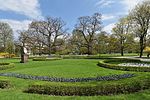Centre for Eastern Studies

Centre for Eastern Studies (OSW, Polish: Ośrodek Studiów Wschodnich) is a Warsaw-based think tank that undertakes independent research on the political, economic and social situation in Central and Eastern Europe, Balkans, Caucasus and Central Asia. The Centre was founded in 1990 and is fully financed from the Polish state budget. In 2006 the Centre was named in honour of its founder Marek Karp. The OSW is the largest of the European Union’s think tanks to focus its research on the part of Europe which until 1989 had been separated from the West by the Iron Curtain. The Centre is particularly active in debates concerning the European Union's policy towards its Eastern neighbours (European Neighbourhood Policy, Eastern Partnership), challenges to energy security in Europe, as well as the political, social and economic transformation of countries neighbouring Poland.
Excerpt from the Wikipedia article Centre for Eastern Studies (License: CC BY-SA 3.0, Authors, Images).Centre for Eastern Studies
Koszykowa, Warsaw Śródmieście (Warsaw)
Geographical coordinates (GPS) Address Nearby Places Show on map
Geographical coordinates (GPS)
| Latitude | Longitude |
|---|---|
| N 52.2207 ° | E 21.0231 ° |
Address
Koszykowa 6A
00-564 Warsaw, Śródmieście (Warsaw)
Masovian Voivodeship, Poland
Open on Google Maps











